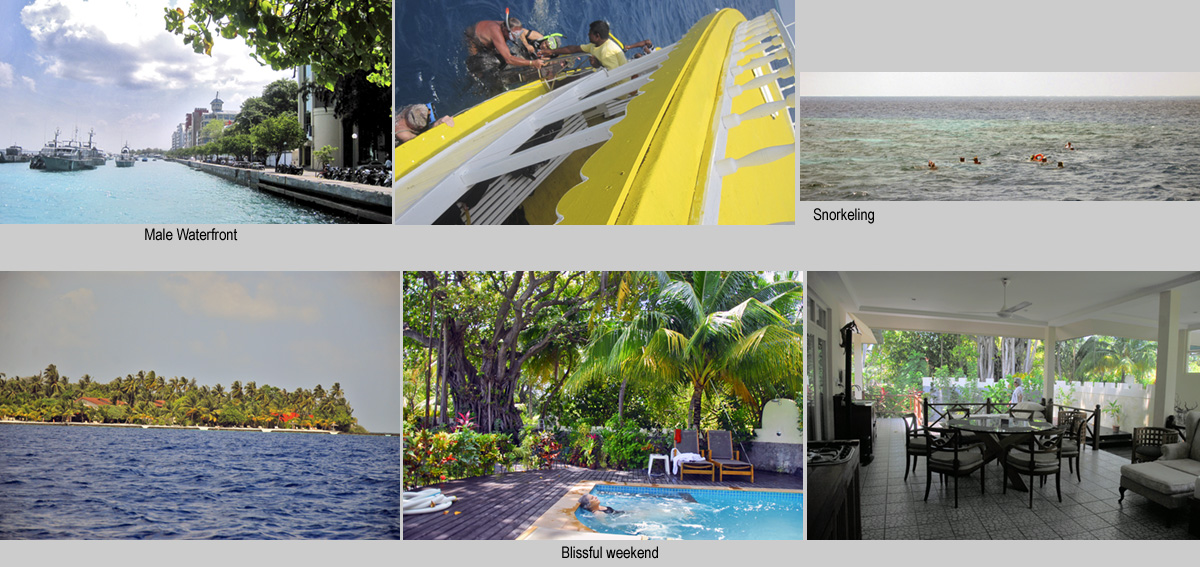Turmoil in the Maldives, February 2012
Robert Tyabji, Male, 24 February 2012
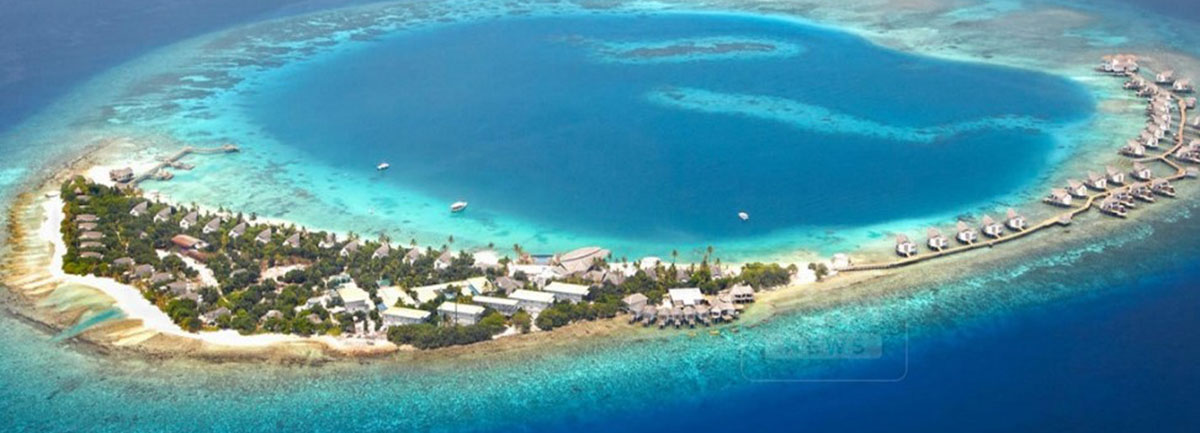
As you have probably heard, there has been quite a lot of turmoil recently in the idyllic and normally peaceful Indian ocean archipelago of the Maldives.
Former Maldives president Mohamed Nasheed who was elected in the country's first democratic election in 2008 resigned voluntarily on 7 February 2012, following the ousting of long-reigning president Maumoon Abdul Gayoom. His resignation followed a series of disturbances prompted by Nasheed's kidnapping of the Chief Judge of the Criminal Court in the capital, Male, and his orders to the army to attack the police, which resulted in a sit-down strike by the security forces, and further demonstrations by his supporters. He had previously given amnesty to more than 300 hardcore criminals, who may well have been ready to do anything he wanted.
During his 3-year presidency (11 November 2008 - 7 February 2012), Nasheed became the darling of democrats and environmentalists worldwide, earning many international awards and praise. He proclaimed himself a champion of the environment and went so far as to announce that Maldives would be carbon neutral in a decade. These brought him international recognition and everyone, including me, saw him as a godsend. His widely publicized underwater cabinet meeting in full diving gear to draw attention to Maldives' predicament in the face of global warming and rising sea levels, was a PR master stroke.
But the reality was quite different. He signed huge natural gas contracts and proposed mega projects that were environment-unfriendly. He faced opposition from the civil service but found a way to neutralize them and the Civil Service Commission (which he himself had been instrumental in establishing) by creating dozens of state-linked companies and transferring civil servants to these companies, as well as employing thousands of fisher folk and other islanders, thereby bringing them under his direct influence and control. To garner support from India, he transferred the management of Male International Airport to GMR, an Indian conglomerate, and, most abhorrent of all to his people, proposed inviting Israel to open a mission in Maldives. It is widely believed that his strategies are masterminded by Mossad advisers. All these actions made him deeply unpopular among thinking Maldivians, while little is known about any of this in the outside world. When the new government took over in February, it was quickly discovered that the country's coffers had been emptied and Maldives was deep in debt, with at least 100 million US dollars owed immediately to foreign creditors.
In February amid the mayhem that was occurring, Nasheed addressed the security forces on the street (click to watch DhiTV's coverage of these extraordinary events). He said he realized he had lost the support of the people and therefore had decided in the interest of the country to resign as president. That announcement was met with shouts of approval from the soldiers. He then went to his office and calmly wrote out his resignation. He changed into a suit and made an official announcement in front of the assembled cabinet and media, and vice president. Waheed was then sworn in by the Chief Justice, as prescribed in the constitution, all of which you may have seen on TV.
But the very next day Nasheed appeared on the street with a crowd of supporters, claiming that he had been ousted at 'gunpoint' in a coup. His friends in the UK, Australia, Sri Lanka, India and other countries took up the coup cry via the media and internet, crying foul and demanding an immediate election. The fact that the so-called coup victim could be seen running free in the streets did little to expose the lie! His supporters went on the rampage, torching public property in Addu, Male and other islands, disrupting life and fomenting a crisis obviously designed to cause anarchy and in the process legitimize Nasheed's reinstatement as president.
In spite of the immediate recognition of the Waheed government by the USA, India and China, the coup theory gained traction in countries where the former president had influential friends. There followed a flurry of media coverage and a tsunami of tweets and postings on Facebook and other social media. The war between constitutional due process and anarchy was being fought on the internet. Delegations from India, USA, the United Nations, the EU, the Commonwealth and others, as well as dozens of journalists, swarmed to Male to assess the events and to spread their versions of the story. Going along with the coup theory, many countries advocated early elections in spite of the fact that an election before November 2013 would be in breach of the constitution.
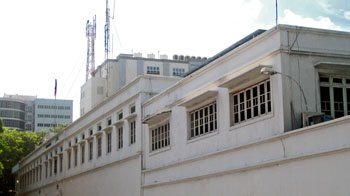 It was my good fortune to be asked by Waheed at the height of all this excitement to go to Male and help out with organizing the media side of the President's Office. I was saddened to find Waheed and his family so entangled in the momentous events swirling around him. Apparently, he had had no idea of the crisis unfolding on the streets. He was sitting quietly at home when it broke and he only came to know about it via local TV.
It was my good fortune to be asked by Waheed at the height of all this excitement to go to Male and help out with organizing the media side of the President's Office. I was saddened to find Waheed and his family so entangled in the momentous events swirling around him. Apparently, he had had no idea of the crisis unfolding on the streets. He was sitting quietly at home when it broke and he only came to know about it via local TV.
An interview with Dr. Waheed on the BBC's Today programme provides an early overview of what actually transpired, and the government's plans for the future:
.
On 16 February the BBC broadcast an illuminating show of former president Nasheed being grilled by Stephen Sackur on the HARDtalk programme (click to watch).
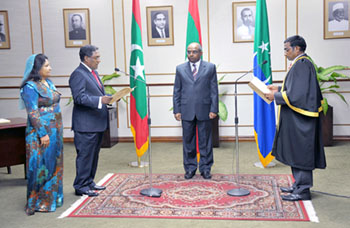 These are the events that led to Nasheed's resignation and the subsequent swearing in of President Waheed Hassan. A few days later, Aljazeera’s Fawzia Ibrahim interviewed Waheed for her 101East programme. Mark Davis of SBS's Dateline spent many days in Maldives. Other journalists presented widely varying scenarios of the events.
These are the events that led to Nasheed's resignation and the subsequent swearing in of President Waheed Hassan. A few days later, Aljazeera’s Fawzia Ibrahim interviewed Waheed for her 101East programme. Mark Davis of SBS's Dateline spent many days in Maldives. Other journalists presented widely varying scenarios of the events.
All this makes me wonder - again - why ANYONE would want to be a president?
The turmoil isn't over yet. Yesterday, 1 March, was the opening of the new session of parliament. Nasheed had been warning publicly that his party, the MDP, would never allow President Waheed to enter parliament to make his opening statements (a constitutional requirement), and that, indeed, parliament would not open at all. In spite of elaborate security arrangements, MDP MPs managed to remove the Speaker's chair and block the entrance to the building. There could well have been an ugly standoff and even bloodshed but Waheed decided to wait it out patiently till 7:00 that evening, and instead of reading his statement, distributed it among the MPs outside parliament, thus fulfilling his legal obligation.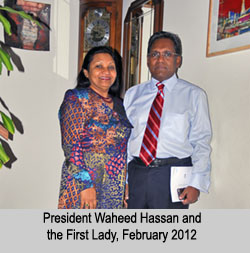 What happens next is anybody's guess.
What happens next is anybody's guess.
While these events were swirling around, I was immensely relieved when Hootoksi joined me in Male. She'd just had her birthday and we were able to celebrate by luxuriating for three days at Hudhuran Fushi, a beautiful resort island in the North Male Atoll. Lolling about on a pristine beach and snorkeling through the wonderland of a Maldives coral reef is my idea of paradise. Hootoksi and I are ever grateful to our Maldivian hosts for their friendship and graceful generosity.
